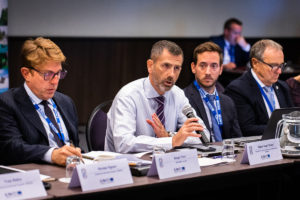European Union ambassador to Peru Diego Mellado started the day, saying that among the priorities of the European Union and its international partners is the fight against organised crime in Latin America, particularly the environmental crime that is devastating the region. “This is one of the most bio-diverse areas of the planet, an enormous space with immense borders that spans 40 percent of the Amazonian space,” said Mellado, while calling for coordination to “combat this scourge that is claiming more and more space”.
General Luis Vera, director of the Environment Directorate of the National Police of Peru, voiced his concern regarding developments in the region, particularly in Peru. “Environmental crime is proliferating at an incredible speed, so we need a structure with strong logistics and capabilities to combat these environmental offences,” said Luis Vera. “The most forceful way to beat crime is by joining forces, coordinating and sharing information,” the general concluded.
The National Senior Public Prosecutor and Environment Coordinator of Public Prosecutors of Peru, Flor de María Vega, added that “there is growing concern about environmental crime in our country.” Flor de María Vega said that Peru has assigned 145 prosecutors to prosecuting these crimes with the support of the National Police of Peru. She also talked about some of their achievements, such as theMercury 2019 operation in February this year in the Madre de Dios area that broke up an illegal mining camp where more than 6,000 people were involved in related crimes such as trafficking in people.
The prosecutor finished her presentation by thanking the EL PAcCTO programme for its support fighting environmental crime, including illegal trade in fauna and flora and illegal mining which “are expanding every day and proving highly profitable.” “We must be organised and learn from the work of the police, prosecutors , INTERPOL, EUROPOL and all European organisations to fight organised groups,” concluded the prosecution authorities coordinator.
Finally, the EL PAcCTO co-director Xavier Cousquer added that environmental crimes have become an extremely serious problem and that the most recent analyses of the region show that these types of crimes are equally or more profitable than drug trafficking. “Obviously, this situation means that we cannot rely on the methods we used to combat these crimes a few years ago.” He stressed that the special techniques used to fight drug trafficking, like undercover agents and controlled deliveries, should also be utilised in the fight against environmental crimes.
Representatives of the security forces and prosecution authorities of Bolivia, Brazil, Chile, Colombia, Costa Rica, Ecuador, El Salvador, Guatemala, Mexico, Panama, Peru and European countries like Germany, Spain, France, Italy and Portugal met with representatives of INTERPOL, EUROPOL and AMERIPOL to spend four days discussing the need for national, regional and international cooperation.



EL PAcCTO has been helping to coordinate and exploit operations linked to illicit trade in mercury for use in illegal gold mining, bird and reptile trafficking, deforestation and timber trafficking, and illegal mining. EL PAcCTO has also driven the creation of specialised multidisciplinary teams to fight large-scale crime.
The participating countries and European experts agreed on the need for better understanding and specific action against these phenomena, taking the Jaguar network as a reference. A network which has been implemented in a coordinated manner by the institutions involved, with support from several specialised European institutions such as EUROPOL.
This was the second event organised by EL PAcCTO whose main objective was to strengthen the work shared by the security forces and prosecution authorities in countries in Latin America and the European Union.
During the meeting, EL PAcCTO pledged its full support for the work of the Jaguar network in 2020, by boosting inter-institutional exchanges between security forces and prosecution authorities and standardising certain actions and investigation procedures in the field by producing a draft guide for investigating environmental crime.
During the seminar, participants made progress with actions to fight illicit traffic in mercury, wood and wildlife, and illegal mining, proposing a high-level meeting with Colombia, Ecuador and Peru.
High Level Conference on Illegal Wildlife Trade in the Americas
The First High Level Conference on Illegal Wildlife Trade in the Americas was held in Lima during the run-up to the regional seminar on environmental crime. It was an opportunity to forge alliances between countries in the region and the main transit and destination countries in the interests of preventing and coordinating control of illegal trade in wildlife. EL PAcCTO organised a side event on complex measures for investigating environmental and related crimes.
The experts participating in the parallel event agreed upon on the need to develop increasingly specific and innovative investigative methods to fight against environmental crimes more effectively. Environmental crime is a source of enormous profit for organised crime groups and has become the third most common type of organised crime worldwide. This change requires a more offensive approach by actors in the criminal chain. The experts stressed that methods hitherto reserved for the fight against drug trafficking such as controlled deliveries and undercover agents should be systematically extrapolated to the fight against environmental crimes. The need to broaden the scope of investigations into money laundering and criminal assets was also pinpointed as a more effective way to stamp out this crime. Finally, development of intelligence, analysis and crossing referencing information in this area, as well as strengthening international cooperation between police forces and prosecutors are also essential to be able to give a firm response to the proliferation of increasingly complex and transnational crimes.
